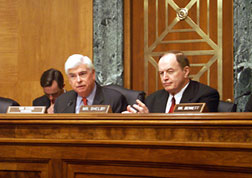 Senate Banking, HUAF Dodd (left) and Shelby voted for seven-year bill.
|
Besides its 15-year length, the House bill adds group life to the insurance lines covered by the federal program. The House bill also requires insurers to provide coverage for nuclear, biological, chemical and radiological (NBCR) terrorist acts. The Senate committee bill, approved 20-1, doesn’t include group life and only calls for a Government Accountability Office study of NBCR insurance.
Industry wants Congress to act soon to extend the backstop, which expires on Dec. 31. “We just want to get a workable bill passed in time before the end of the year,” says a source.
Kelly Knott, Associated General Contractors’ government affairs director for labor, safety and risk management, thinks the House and Senate will compromise on the extension’s length. “It wouldn’t surprise me to see something around 10 years,” she says. But the administration already has compromised by accepting a seven-year extension and may not go any further. Knott thinks a bigger battle will be over NBCR. She says House and Senate negotiators will have a harder time finding middle ground on that issue.
Treasury Secretary Henry M. Paulson Jr. told banking panel Chairman Christopher Dodd (D-Conn.) and the committee’s top Republican, Richard Shelby of Alabama, on Oct. 17 that the administration believes the backstop program “should be phased out in favor of a private market for terrorism insurance.” He said the administration wants the new bill to reflect three key elements: It “should be temporary and short-term,” it should not be expanded and it should have higher “retentions” by the private sector. Dodd and Shelby voted for the committee bill.
Paulson said the administration will not oppose the banking committee bill, but warned if it moves “further away from our key elements, the President’s senior advisers would recommend that he veto the bill.”
The program was created by the 2002 Terrorism Risk Insurance Act in response to the 9/11 terrorist attacks. The 2002 law authorized the program for three years. Congress extended it for two years in 2005.
bill to extend federal terrorism-insurance backstop coverage for seven years has cleared a Senate committee and was further boosted when the Bush administration said it wouldn’t oppose it. That gives the bill, which the Senate Banking, Housing and Urban Affairs Committee approved on Oct. 17, a leg up on the 15-year extension the House passed in September. That House version drew a White House veto warning.